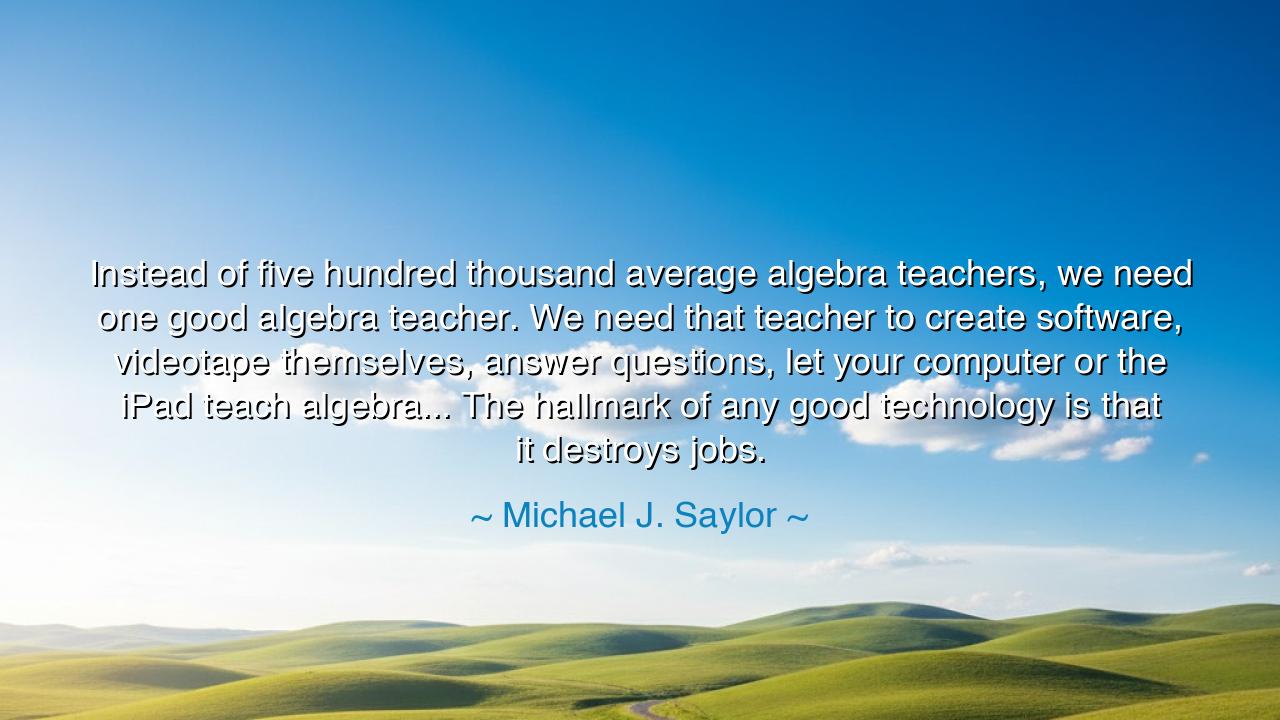
Instead of five hundred thousand average algebra teachers, we
Instead of five hundred thousand average algebra teachers, we need one good algebra teacher. We need that teacher to create software, videotape themselves, answer questions, let your computer or the iPad teach algebra... The hallmark of any good technology is that it destroys jobs.






Michael J. Saylor once declared with unflinching clarity: “Instead of five hundred thousand average algebra teachers, we need one good algebra teacher. We need that teacher to create software, videotape themselves, answer questions, let your computer or the iPad teach algebra... The hallmark of any good technology is that it destroys jobs.” In these words lies not merely a commentary on education, but a profound revelation about the nature of technology itself. For every great tool mankind has forged, from fire to electricity, has overturned the old ways, sweeping aside countless roles and traditions, while at the same time raising humanity into a new realm of possibility.
Understand, O listener: the cry for “one great teacher” above the multitude of average ones is not contempt for the many, but an acknowledgment of excellence. One voice, if captured and multiplied by technology, can echo across the world with greater power than a hundred thousand voices confined to single classrooms. The printing press needed not armies of scribes, but one Gutenberg. The lightbulb did not require a million candles, but one Edison. So too, Saylor proclaims, in the age of digital wonders, one master teacher may teach more students than could ever fit into the walls of schools.
History itself proves this pattern. Consider how the invention of the loom swept away countless weavers, yet clothed millions more. Or how the mechanized press ended the trade of scribes, yet unleashed knowledge to every corner of the earth. Indeed, every true technology bears this double-edged gift: the destruction of the old, and the birth of the new. In Saylor’s words, the destruction of “jobs” is not an end in itself, but the breaking of chains that once bound knowledge and opportunity to scarcity.
Yet, let us not ignore the sorrow that comes with such change. When technology ascends, many are displaced, their roles dissolved into history’s dust. The horse-drawn carriage gave way to the automobile, and entire trades vanished. But mankind, in every age, has adapted—shifting from lost professions to new callings that could not have been imagined before. It is not the end of human labor that Saylor foretells, but its transformation. For while technology may teach algebra, only humans can dream, question, and innovate beyond the limits of machines.
The parable of the great teacher who teaches millions through software and devices mirrors the story of Socrates and Plato. Socrates himself never wrote his teachings, but through Plato, his voice spread far beyond his lifetime. Imagine, then, if Socrates had possessed the power of the digital realm—to speak once, yet reach billions. This is the promise of our age: that wisdom, captured and magnified, may shape not just a city, nor a nation, but the entire world.
From these words comes a lesson clear and sharp: do not cling too tightly to the safety of the old ways. Embrace the wave of technology, for though it may seem to strip away what once was, it brings forth a thousand new paths for those willing to adapt. The measure of survival is not resistance to change, but readiness to evolve. If your labor is taken by the machine, let your creativity, your vision, your humanity build something greater that the machine cannot.
Therefore, children of tomorrow, do not fear when the ground trembles beneath you. The loom, the press, the steam engine, the computer—all once seemed to “destroy jobs,” yet each raised humanity to higher ground. Let the machines teach algebra, let the screens deliver lessons—but let men and women rise beyond this, to guide, to inspire, to create. For the true hallmark of technology is not the loss of what was, but the birth of what can yet be.
And so, take this teaching to heart: seek excellence, embrace technology, and above all, remain human in spirit. For the world will ever change, but the soul that adapts, that learns, that dares to rise above the ruins of yesterday—that soul will never be destroyed. It will, instead, lead the way into the future.






AAdministratorAdministrator
Welcome, honored guests. Please leave a comment, we will respond soon